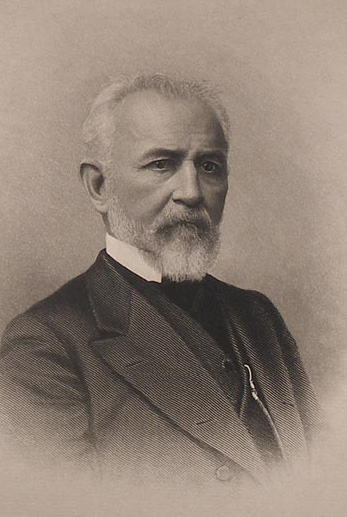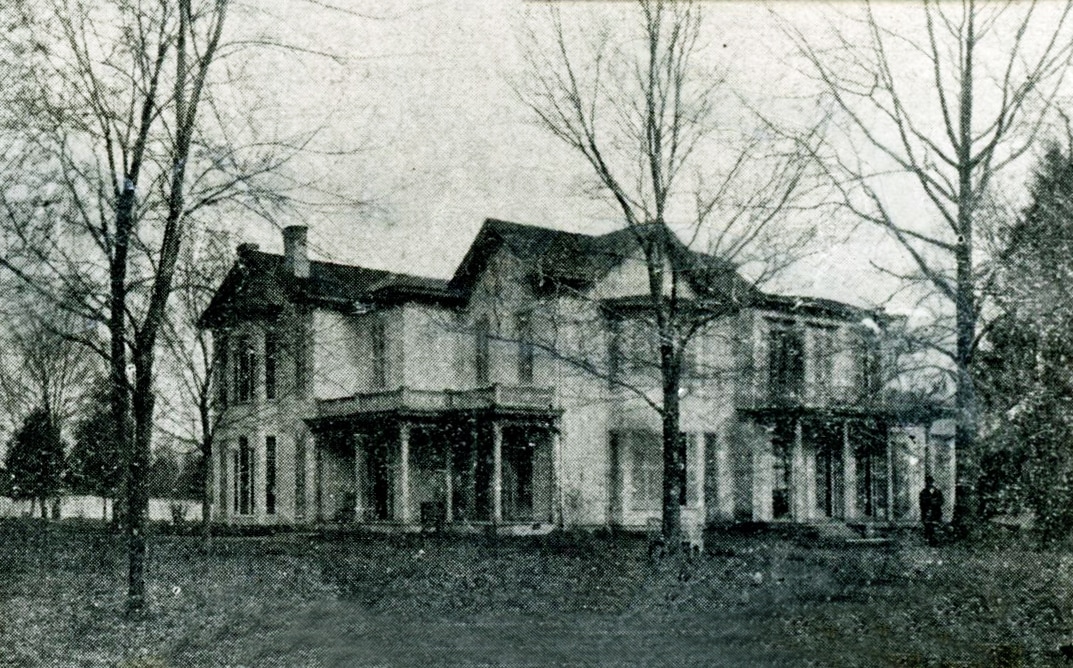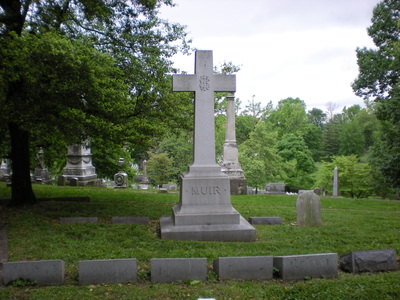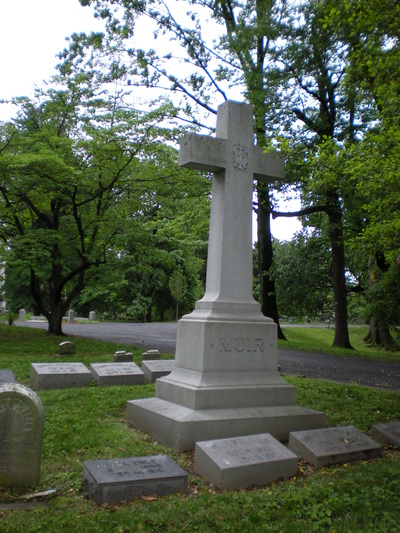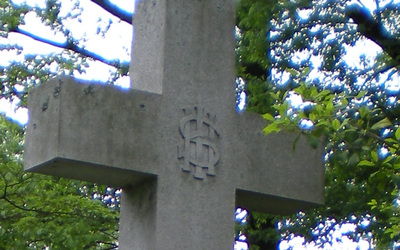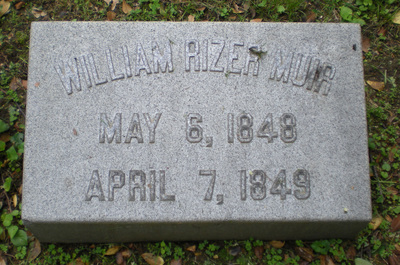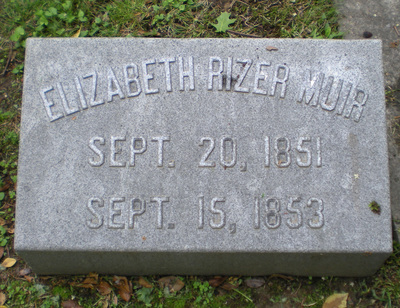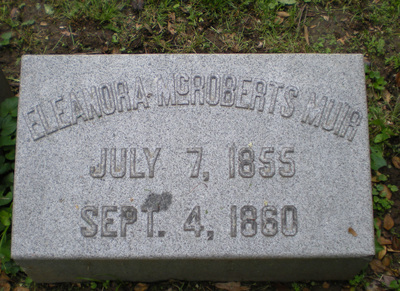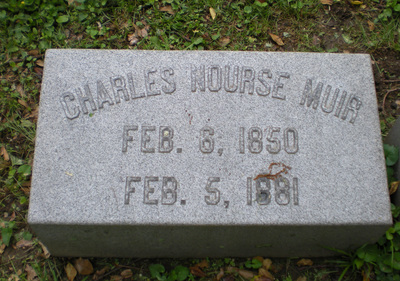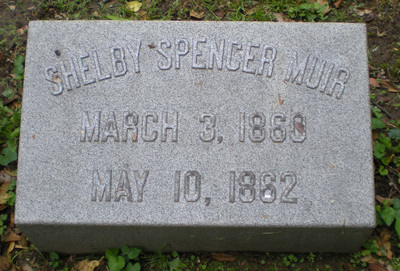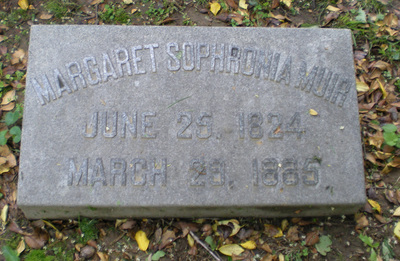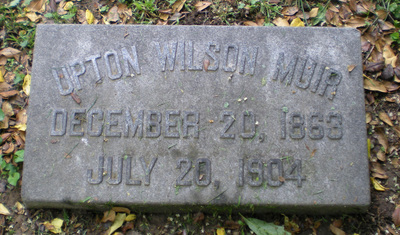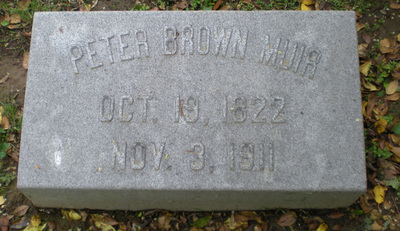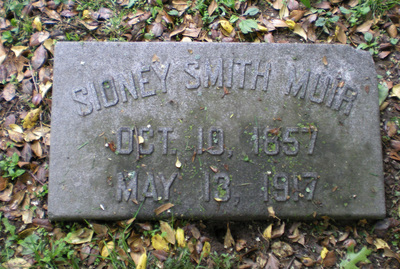Judge Peter B. Muir: Town Father
Peweeans who venture down the sometimes-muddy, sometimes-dusty, sometimes-frozen, and often-rutted gravel road known as Muirs Lane may wonder where the name came from.
The road was originally named Oaklea, after the estate of the late Edwin Bryant. In 1870, the Muir family bought it from St. James Episcopal Church minister Rev. George D. Cummins and owned it until 1912. At some point the name was changed to Muirs Lane, in honor of the Muir family.
Judge Peter Brown Muir was the family patriarch and by the time he moved his family to Pewee Valley in June 1870, he had left the bench -- and a professorship at University of Louisville’s law school -- and was working in private practice with attorneys Martin Bijur and George M. Davie in Louisville. The reason the powerful judge quit public service was simple – the pay wasn’t sufficient to support his large family. He and his wife, Sophronia Rizer Muir, had 12 children, although many died young and their oldest was already married by the time they moved to Pewee Valley:
The road was originally named Oaklea, after the estate of the late Edwin Bryant. In 1870, the Muir family bought it from St. James Episcopal Church minister Rev. George D. Cummins and owned it until 1912. At some point the name was changed to Muirs Lane, in honor of the Muir family.
Judge Peter Brown Muir was the family patriarch and by the time he moved his family to Pewee Valley in June 1870, he had left the bench -- and a professorship at University of Louisville’s law school -- and was working in private practice with attorneys Martin Bijur and George M. Davie in Louisville. The reason the powerful judge quit public service was simple – the pay wasn’t sufficient to support his large family. He and his wife, Sophronia Rizer Muir, had 12 children, although many died young and their oldest was already married by the time they moved to Pewee Valley:
- Isabella Muir Weissinger (1846-1920); married in 1867 to Harry Weissinger
- William Rizer Muir (May 6, 1848-April 7, 1849) named for Judge Muir’s grandfather, Dr. William Muir (1752-November 13, 1838), who raised the judge for several years after he was orphaned in 1833; his middle name was his mother’s maiden name
- Charles Nourse Muir (February 8, 1850-February 5, 1881), whose middle name came from Bardstown Judge J.D. Nourse, from whom Judge Muir purchased his law books while he was studying for the bar; listed in 1870 census as working as a clerk in a tobacco house – possibly his brother-in-law Harry Weissinger’s company -- and in the 1880 census as studying law
- Elizabeth Rizer Muir (September 20, 1851-September 15, 1853), named for her maternal grandmother
- Thomas Riley (born about 1853) called “Riley,” and named for Judge Muir’s first law partner. He became a farmer in Normandy, Ky.
- Eleanora McRoberts Muir (July 7, 1855-September 4, 1860), called Nora and named for her mother’s sister, Ellenora Rizer
- Sidney Smith Muir (October 10, 1857-May 13, 1917), married to Sarah Lloyd Burge (d. April 4, 1946, buried Cave Hill), died at the hotel Henry Watterson of cerebral hemorrhage; one child Anna Burge Muir Humphrey (b. about 1890 at Oaklea in Pewee Valley; died April 5, 1934 of peritonitis); owned the horse farm Arbor Lea in Hikes Point, Louisville, Ky.
- Shelby Spencer Muir (March 3, 1860-May 10, 1862), named for two of the five Kentucky counties where Judge Muir served as the Fifth District circuit court judge. He died of scarlet fever, according to his obituary.
- Lillian Muir Semple (March 16, 1862-April 4, 1921), wife of Alexander Latimer Semple (July 22, 1859-August 18, 1906); one child, Muir Semple (June 4, 1887 - Feb 18, 1952)
- Upton W. Muir (December 20, 1863-July 20, 1904); married 1888 to Virginian Hebe Harrison; graduated University of Virginia 1886, taking the degree of Master of Arts and the debater's prize, a fifty dollar gold medal; graduated University of Virginia’s law school 1887; 1890 became a partner in his father’s law practice; appointed a circuit court judge by Governor Beckham in 1902 and elected to a six-year term in November, 1903; drowned while vacationing with his wife and two children in Cape May, New Jersey
- Nellie Muir Smith (December 9, 1865-January 3, 1927) Married Allen Hall Smith on July 9, 1890 in Louisville. Died at the home of her brother-in-law, Dr. N.S. Penick in Springfield, Ill. Buried at Oak Ridge Cemetery in Springfield.
- Sophronia Muir Penick (March 12, 1869-February 18, 1926) Married Dr. Ninus Smith Penick, a physician in Springfield, Ill. Buried Oak Ridge Cemetery, Springfield. Six children: Muir Penick (1898-1935); Margaret Penick Oligner (1900-1980); Elizabeth Penick Smith (1902-1966); Allen Smith Penick (1902-1938); Nell Penick Seago (1905-1995); and William Franklin Penick (1910-1937)
Judge Muir's Role in Pewee Valley
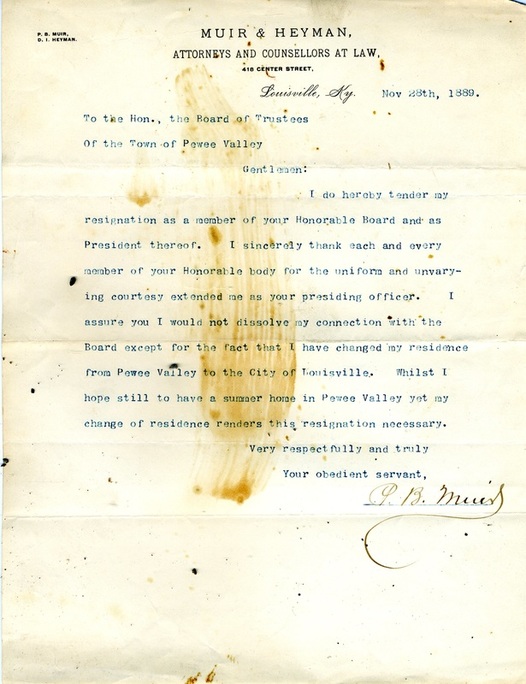 Judge Muir's resignation letter from the Town of Pewee Valley's Board of Trustees. City of Pewee Valley archives at Town Hall.
Judge Muir's resignation letter from the Town of Pewee Valley's Board of Trustees. City of Pewee Valley archives at Town Hall.
Pewee Valley took advantage of Judge Muir’s skills as a barrister and as a politician. During the 1870s and 1880s, he served as President of the city’s Board of Trustees for 14 years and wrote the charter for the Pewee Valley Cemetery. He resigned from the Board of Trustees on November 28, 1889, when he moved to the Louisville home of his daughter and son-in-law, Belle and Harry Weissinger.
By that time, he was a widower. Sophronia had died on March 26, 1885, when her clothing caught fire, according to the April 8, 1885 edition of the Hartford Herald:
Mrs. Judge P B. Muir, formerly of Bardstown, was fatally burned at her residence in Pewee Valley last Saturday night. She had been sick and was up by the fire taking medicine when her clothing caught fire, aud before the flames could be extinguished she was burned so badly that death ensued the next night.
The story of her death, with additional details, was also carried in the March 30, 1885 edition of the St. Paul Daily Globe:
Louisville, Ky., March 26,—While standing before a fire at her residence in Pewee Valley Mrs. Judge P. B. Muir, a prominent Society lady of this City, had her clothing take fire and she was burned to death. Her son, Sidney, in attempting to extinguish the flames, was seriously burned.
By that time, he was a widower. Sophronia had died on March 26, 1885, when her clothing caught fire, according to the April 8, 1885 edition of the Hartford Herald:
Mrs. Judge P B. Muir, formerly of Bardstown, was fatally burned at her residence in Pewee Valley last Saturday night. She had been sick and was up by the fire taking medicine when her clothing caught fire, aud before the flames could be extinguished she was burned so badly that death ensued the next night.
The story of her death, with additional details, was also carried in the March 30, 1885 edition of the St. Paul Daily Globe:
Louisville, Ky., March 26,—While standing before a fire at her residence in Pewee Valley Mrs. Judge P. B. Muir, a prominent Society lady of this City, had her clothing take fire and she was burned to death. Her son, Sidney, in attempting to extinguish the flames, was seriously burned.
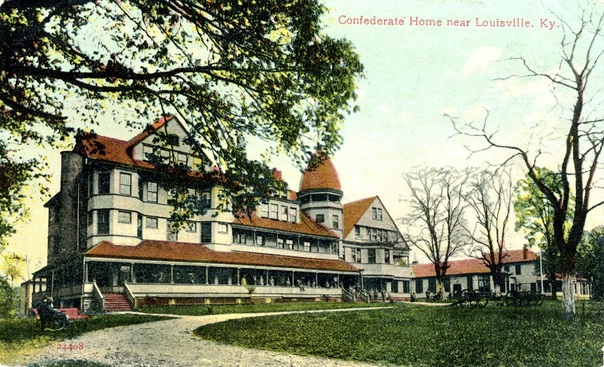 Kentucky Confederate Home post card, ca. 1911
Kentucky Confederate Home post card, ca. 1911
The judge continued to summer in Pewee Valley until his death in 1911 and also maintained some involvement in the city’s affairs. In the spring of 1902, he helped with the city’s unsuccessful fight to prevent the Kentucky Confederate Home from locating in the abandoned Villa Ridge Hotel by appealing directly to Governor Beckham. Though Beckham turned a deaf ear to the Muir’s entreaties, he evidently wished to remain in the judge’s good graces. Later that same year, he appointed the judge’s son, Upton, as Judge of the Common Please division, No. 3, of the Jefferson Circuit Court, when the General Assembly added two branches.
Fire Destroys Oaklea in 1905
On Saturday, May 26, 1905, Oaklea was destroyed by fire – a $15,000 loss according to Fire and Water Engineering’s Saturday, June 3, 1905 issue. The Courier-Journal covered the fire the next day:
FLAMES
___________
Destroy Judge Muir's Pe-
wee Valley Home
___________________
EFFORTS TO CHECK USELESS
___________________
BULK OF THE FURNITURE WAS
BURNED WITH THE DWELLING
_______________________
NEIGHBORS QUICK TO HELP
Judge Peter B. Muir's handsome residence at Pewee Valley, in which he had lived since June 1870, was burned to the ground last evening by a fire that started in the kitchen flue at 6 o'clock and which spread rapidly over the frame structure. Much of the household goods was saved from the lower floor, but practically everything in the second floor was lost. It is estimated that the loss on the house is about $8,000 and that the loss of effects and furniture is about $7,000. The insurance amounts to $5,000.
Dinner had just been served when Peter B. Muir, Jr., the five-year-old son of Mrs. Upton Muir, ran down stairs crying and said the house was on fire. He was not believed at first, but when he wailed loudly a servant ran up stairs and found the house full of smoke. A few minutes later flames broke out under the room. The cry of fire broke out over the little town and the town bell was rung. Soon a crowd of 500 persons had gathered at the scene of the fire and the men busied themselves carrying out everything that they could reach. (Editor's note: Pewee Valley's entire population was under 500 in 1900. Many of the people at the fire had to have been inmates of the Kentucky Confederate Home, which had opened three years before across Muirs Lane from Oaklea. Did they know how vigorously the good judge opposed the home a few years earlier?) As the fire was in the roof and it had not gained much headway when it was discovered, the volunteers had much time at their disposal in carrying the furniture from the lower level.
Mrs. Upton Muir, with her son and daughter, arrived from Washington just a few days ago. All of her trunks and clothing were in her room on the second floor of the house and all were lost. The apartments of S.S. Muir and his wife were also on the second floor and scarcely any of their things were saved. Practically nothing was saved from Judge Muir's room and his private library was lost. His law library is in the city.
The Muir house, which was for the most part built by Judge Muir after he purchased the place thirty-five years ago, was one of the most complete country homes in the South. Parts of it were of the original structure, nearly half a century old, and were of charming design and beautiful in appearance.
********
Saved the Doorbell.
On account of the zeal of those who rushed to the fire to save something, many ridiculous incidents resulted. One man took an ax, and while a large crowd looked on in interest, chopped away the wood about the handle of the front door bell and carefully took it out of danger from the fire. The kitchen stove, with the fire in it and the bread still baking in the oven, was carried out in the yard. Many of the window sashes and the panes were taken out, and some of the woodwork of the house was saved.
FLAMES
___________
Destroy Judge Muir's Pe-
wee Valley Home
___________________
EFFORTS TO CHECK USELESS
___________________
BULK OF THE FURNITURE WAS
BURNED WITH THE DWELLING
_______________________
NEIGHBORS QUICK TO HELP
Judge Peter B. Muir's handsome residence at Pewee Valley, in which he had lived since June 1870, was burned to the ground last evening by a fire that started in the kitchen flue at 6 o'clock and which spread rapidly over the frame structure. Much of the household goods was saved from the lower floor, but practically everything in the second floor was lost. It is estimated that the loss on the house is about $8,000 and that the loss of effects and furniture is about $7,000. The insurance amounts to $5,000.
Dinner had just been served when Peter B. Muir, Jr., the five-year-old son of Mrs. Upton Muir, ran down stairs crying and said the house was on fire. He was not believed at first, but when he wailed loudly a servant ran up stairs and found the house full of smoke. A few minutes later flames broke out under the room. The cry of fire broke out over the little town and the town bell was rung. Soon a crowd of 500 persons had gathered at the scene of the fire and the men busied themselves carrying out everything that they could reach. (Editor's note: Pewee Valley's entire population was under 500 in 1900. Many of the people at the fire had to have been inmates of the Kentucky Confederate Home, which had opened three years before across Muirs Lane from Oaklea. Did they know how vigorously the good judge opposed the home a few years earlier?) As the fire was in the roof and it had not gained much headway when it was discovered, the volunteers had much time at their disposal in carrying the furniture from the lower level.
Mrs. Upton Muir, with her son and daughter, arrived from Washington just a few days ago. All of her trunks and clothing were in her room on the second floor of the house and all were lost. The apartments of S.S. Muir and his wife were also on the second floor and scarcely any of their things were saved. Practically nothing was saved from Judge Muir's room and his private library was lost. His law library is in the city.
The Muir house, which was for the most part built by Judge Muir after he purchased the place thirty-five years ago, was one of the most complete country homes in the South. Parts of it were of the original structure, nearly half a century old, and were of charming design and beautiful in appearance.
********
Saved the Doorbell.
On account of the zeal of those who rushed to the fire to save something, many ridiculous incidents resulted. One man took an ax, and while a large crowd looked on in interest, chopped away the wood about the handle of the front door bell and carefully took it out of danger from the fire. The kitchen stove, with the fire in it and the bread still baking in the oven, was carried out in the yard. Many of the window sashes and the panes were taken out, and some of the woodwork of the house was saved.
A new Colonial Revival-style home was rebuilt by Shelbyville contractors L. H. Gruber & Sons on the first Oaklea’s foundation. Gruber had completed a summer home in Shelbyville, Ky., for Judge Muir’s son-in-law, Harry Weissinger, known as Undulata, two years before.
A new Colonial Revival-style home was rebuilt by Shelbyville contractors L. H. Gruber & Sons on the first Oaklea’s foundation. Gruber had completed a summer home in Shelbyville, Ky., for Judge Muir’s son-in-law, Harry Weissinger, known as Undulata, two years before.
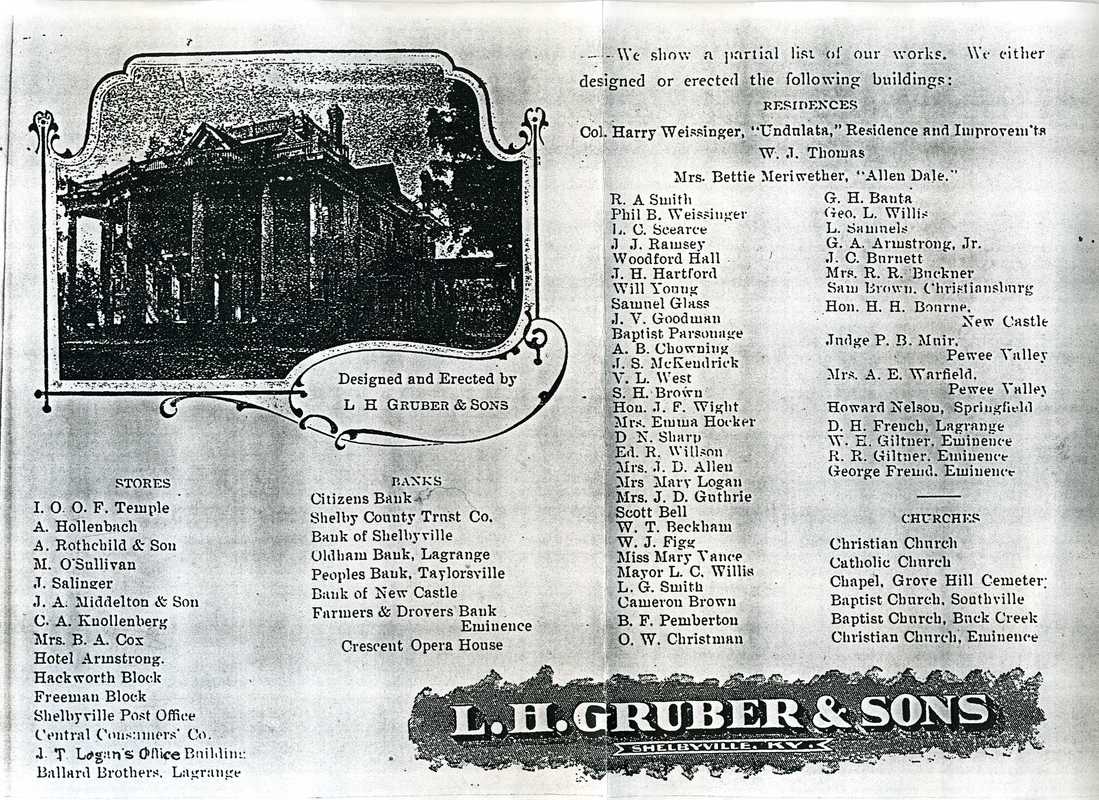
Advertisement for L.H. Gruber & Sons, Shelbyville, the contractors who rebuilt Oaklea after the fire. Their listing includes Judge P.B. Muir's home in Pewee Valley; Undulata, owned by his daughter and son-in-law Belle and Harry Weissinger; and the Shelbyville home of his grandson, Phil B. Weissinger.
Judge Muir's Death
Judge Muir’s death and funeral received extensive coverage in the Louisville Evening Post:
DEATH’S HAND IS LAID ON JUDGE PETER MUIR
________
End Peaceful, After Long Illness For One of the Oldest and Best-Known Lawyer
_________
FAMILY IS NEAR WHEN HIS LIFE CLOSES
Judge Peter Brown Muir, one of the oldest and best-known lawyers of Kentucky, died at 10:45 o’clock this morning at his summer home at Pewee Valley, where he had been gradually declining with infirmities due to his age since last May. He had been bedfast for the last six weeks, since which time apprehension that he might not recover has been entertained. Judge Muir was surrounded by the members of his family when he passed away, most of his children having been at the home the entire summer. His death was due to no specific ailment.
*********
Native of Bardstown
Peter Brown Muir was born at Bardstown, Ky., October 19, 1822. He was graduated from Hanover College in Indiana, where he took the regular university course in addition to the study of law. After leaving college, he returned to Bardstown and took up the practice of law. At the age of 26, he married Miss Sophronia Rizer, also of Bardstown. His wife died here 26 years ago.
The practice of Mr. Muir at Bardstown grew to such an extent and his popularity was so marked that he found it necessary to move his offices to Louisville, where there were greater opportunities for a man of his abilities and ambitions. Thus, in 1853 he came here and established the law firm of Riley & Muir. Shortly after this firm was established, he was elected Judge of the Circuit Court. His division embraced the counties of Jefferson, Bullitt and Shelby.
He expressed his desire to resign from this office several times, but he was always urged to continue on the bench.
************
Resigns as Judge
However, after serving several years, he became so insistent in his demand to be relieved that the Judgeship of the Court of Common Pleas was virtually created for him.
After a few years as Judge of the Court of Common Pleas, he went into the practice of law in the firm of Muir & Bijur. This was the leading law firm of Louisville for several years until the death of Martin Bijur twenty years ago. Judge Muir then took as partner his son, Upton Muir, and the firm did a flourishing business, until it was dissolved by the election of Upton Muir to the bench of the Circuit Court. In May, 1904, Upton Muir was drowned at Cape May, and Lee Hamilton was taken into the office and has been associated with Judge Muir since that time.
He was once elected Commonwealth’s Attorney and also served in the State Legislature and the Louisville City. He resigned every office he ever held, doing efficient work, however, before doing so.
Judge Muir was a member of the Pewee Valley Presbyterian Church. He is survived by four daughters, two sons and 16 grandchildren. His daughters are Mrs. Harry Weissinger and Mrs. Alexander Semple of Louisville; and Mrs. A.H. Smith and Mrs. H.S. Penick of Springfield, Ill. His sons are T.R. Muir, a farmer, Normandy, Ky. and S.S. Muir of Louisville. Probably the best known of his grandchildren is Judge Muir Weissinger, Judge of the County Court.
**********
Judge Muir’s death and funeral received extensive coverage in the Louisville Evening Post:
DEATH’S HAND IS LAID ON JUDGE PETER MUIR
________
End Peaceful, After Long Illness For One of the Oldest and Best-Known Lawyer
_________
FAMILY IS NEAR WHEN HIS LIFE CLOSES
Judge Peter Brown Muir, one of the oldest and best-known lawyers of Kentucky, died at 10:45 o’clock this morning at his summer home at Pewee Valley, where he had been gradually declining with infirmities due to his age since last May. He had been bedfast for the last six weeks, since which time apprehension that he might not recover has been entertained. Judge Muir was surrounded by the members of his family when he passed away, most of his children having been at the home the entire summer. His death was due to no specific ailment.
*********
Native of Bardstown
Peter Brown Muir was born at Bardstown, Ky., October 19, 1822. He was graduated from Hanover College in Indiana, where he took the regular university course in addition to the study of law. After leaving college, he returned to Bardstown and took up the practice of law. At the age of 26, he married Miss Sophronia Rizer, also of Bardstown. His wife died here 26 years ago.
The practice of Mr. Muir at Bardstown grew to such an extent and his popularity was so marked that he found it necessary to move his offices to Louisville, where there were greater opportunities for a man of his abilities and ambitions. Thus, in 1853 he came here and established the law firm of Riley & Muir. Shortly after this firm was established, he was elected Judge of the Circuit Court. His division embraced the counties of Jefferson, Bullitt and Shelby.
He expressed his desire to resign from this office several times, but he was always urged to continue on the bench.
************
Resigns as Judge
However, after serving several years, he became so insistent in his demand to be relieved that the Judgeship of the Court of Common Pleas was virtually created for him.
After a few years as Judge of the Court of Common Pleas, he went into the practice of law in the firm of Muir & Bijur. This was the leading law firm of Louisville for several years until the death of Martin Bijur twenty years ago. Judge Muir then took as partner his son, Upton Muir, and the firm did a flourishing business, until it was dissolved by the election of Upton Muir to the bench of the Circuit Court. In May, 1904, Upton Muir was drowned at Cape May, and Lee Hamilton was taken into the office and has been associated with Judge Muir since that time.
He was once elected Commonwealth’s Attorney and also served in the State Legislature and the Louisville City. He resigned every office he ever held, doing efficient work, however, before doing so.
Judge Muir was a member of the Pewee Valley Presbyterian Church. He is survived by four daughters, two sons and 16 grandchildren. His daughters are Mrs. Harry Weissinger and Mrs. Alexander Semple of Louisville; and Mrs. A.H. Smith and Mrs. H.S. Penick of Springfield, Ill. His sons are T.R. Muir, a farmer, Normandy, Ky. and S.S. Muir of Louisville. Probably the best known of his grandchildren is Judge Muir Weissinger, Judge of the County Court.
**********
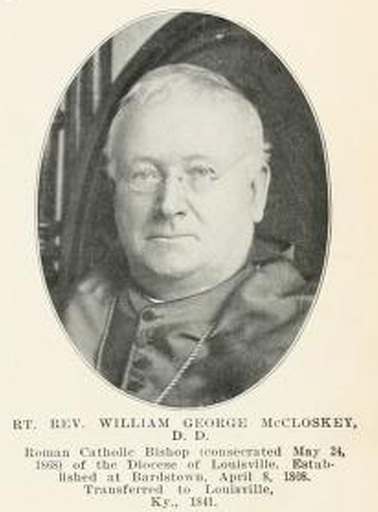
Friend of Bishop McCloskey
Judge Muir was considered one of the leading jurists of the Kentucky bar. He had a great following as a legal practitioner and for 50 years has been the legal representative of the Catholic Church in Kentucky. He was a very close friend of the late Bishop McCloskey and has hosts of friends in Catholic circles. He was highly regarded as a jurist and a gentleman by his associates in his profession and was a man of courteous deportment and kind-heartedness always. He possessed a combative willpower and was a very strenuous and willing worker. His cases were always given the closest attention and he was very thorough in their preparation. It is not recorded that an adversary every found a point in a case under trial that Judge Muir was not familiar with.
He has been a most diligent worker all his life and was to be seen at his office every day until he was stricken with the illness a few weeks ago that ultimately caused his death. It is said that the illness was brought on through overwork on the Ewald case, which he prepared and worked on all winter.
Judge Muir was considered one of the leading jurists of the Kentucky bar. He had a great following as a legal practitioner and for 50 years has been the legal representative of the Catholic Church in Kentucky. He was a very close friend of the late Bishop McCloskey and has hosts of friends in Catholic circles. He was highly regarded as a jurist and a gentleman by his associates in his profession and was a man of courteous deportment and kind-heartedness always. He possessed a combative willpower and was a very strenuous and willing worker. His cases were always given the closest attention and he was very thorough in their preparation. It is not recorded that an adversary every found a point in a case under trial that Judge Muir was not familiar with.
He has been a most diligent worker all his life and was to be seen at his office every day until he was stricken with the illness a few weeks ago that ultimately caused his death. It is said that the illness was brought on through overwork on the Ewald case, which he prepared and worked on all winter.
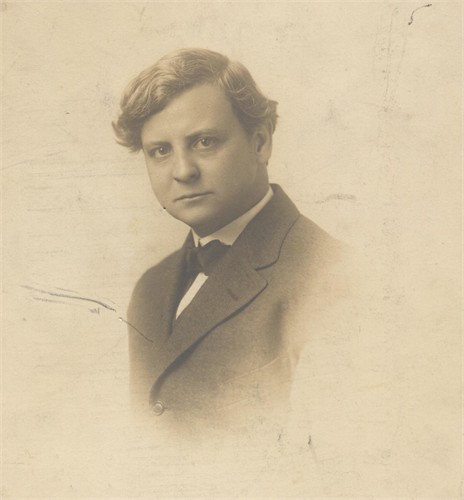 Muir Weissinger, ca. 1914, was the grandson of Judge Peter B. Muir and followed in his grandfather's footsteps by becoming a Jefferson County judge. Courtesy John Manger, descendant.
Muir Weissinger, ca. 1914, was the grandson of Judge Peter B. Muir and followed in his grandfather's footsteps by becoming a Jefferson County judge. Courtesy John Manger, descendant.
A second Evening Post article that ran the day after his death reported:
THE DEATH OF JUDGE MUIR
Louisville loses a fine citizen and the local bar its oldest and one of its most distinguished members to Judge Peter B. Muir, whose death was announced Friday.
In our local columns yesterday, the Evening Post gave in detail the most interesting features in Judge Muir’s long and honorable career. Not only was he, as noted yesterday, the oldest active practitioner at the local bar, but he was, as far as we are informed, the only surviving Kentuckian who served upon the State bench both before and after the Civil War.
Judge Muir’s career at the Kentucky bar extended back so far as to be beyond the personal recollection of any but the oldest of our citizens. When he began practice, Henry Clay was still living and every prominent courthouse in the State had its traditions of Ben Hardin and Richard Menefee and Sergeant S. Prentice and Judge Rowan and the other legal giants of Kentucky of antebellum days. Not only did he survive that generation, but he lived to sit himself upon the bench after the war, to see a son of fine promise – unfortunately cut off by an untimely death – occupy the same place and a grandson is today sitting as one of the judges in the county (Editor's note: the grandson referred to was Muir Weissinger, son of his oldest daughter, Belle).
At no time during this lengthy period did Judge Muir really retire from the practice of law. Less than six months ago he prepared for the Court of Appeals an able and exhaustive brief in the Ewald tax case*, and until a short time ago he acted as the legal advisor of the Catholic Bishop in all the complicated legal business of the diocese.
Despite his advanced age and during the last few months his apparent feebleness, it will be difficult for men to realize that Judge Muir has passed away. He has been the dean of the legal profession for so many years, he has survived so many able lawyers of a generation later than his own, his opinion invariably carried such weight and his personal reminiscences were so delightful that he seemed a permanent fixture.
* The Ewald Iron Company, which had $1,800,000 in bank deposits in St. Louis when it went out of business in 1910, was sued by both Lyon County and Jefferson County, Ky., for taxes.
THE DEATH OF JUDGE MUIR
Louisville loses a fine citizen and the local bar its oldest and one of its most distinguished members to Judge Peter B. Muir, whose death was announced Friday.
In our local columns yesterday, the Evening Post gave in detail the most interesting features in Judge Muir’s long and honorable career. Not only was he, as noted yesterday, the oldest active practitioner at the local bar, but he was, as far as we are informed, the only surviving Kentuckian who served upon the State bench both before and after the Civil War.
Judge Muir’s career at the Kentucky bar extended back so far as to be beyond the personal recollection of any but the oldest of our citizens. When he began practice, Henry Clay was still living and every prominent courthouse in the State had its traditions of Ben Hardin and Richard Menefee and Sergeant S. Prentice and Judge Rowan and the other legal giants of Kentucky of antebellum days. Not only did he survive that generation, but he lived to sit himself upon the bench after the war, to see a son of fine promise – unfortunately cut off by an untimely death – occupy the same place and a grandson is today sitting as one of the judges in the county (Editor's note: the grandson referred to was Muir Weissinger, son of his oldest daughter, Belle).
At no time during this lengthy period did Judge Muir really retire from the practice of law. Less than six months ago he prepared for the Court of Appeals an able and exhaustive brief in the Ewald tax case*, and until a short time ago he acted as the legal advisor of the Catholic Bishop in all the complicated legal business of the diocese.
Despite his advanced age and during the last few months his apparent feebleness, it will be difficult for men to realize that Judge Muir has passed away. He has been the dean of the legal profession for so many years, he has survived so many able lawyers of a generation later than his own, his opinion invariably carried such weight and his personal reminiscences were so delightful that he seemed a permanent fixture.
* The Ewald Iron Company, which had $1,800,000 in bank deposits in St. Louis when it went out of business in 1910, was sued by both Lyon County and Jefferson County, Ky., for taxes.
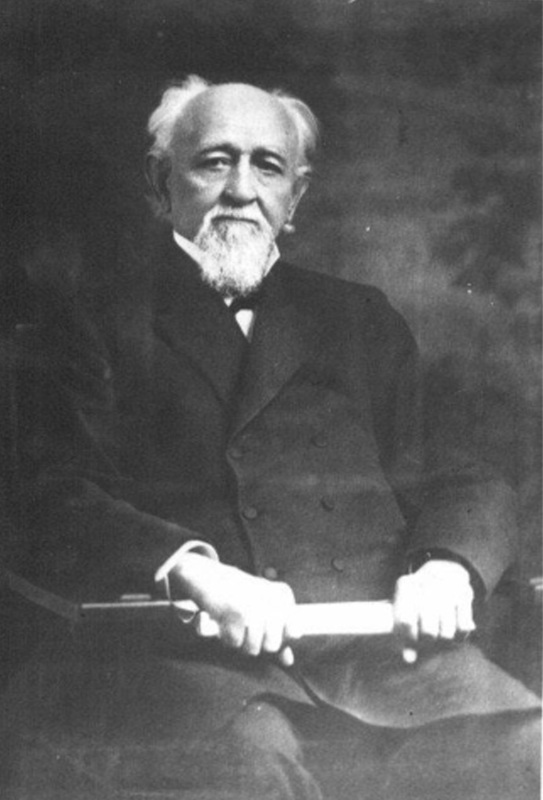 This portrait of Judge Muir appeared with his obituary. Courtesy John Manger, descendant.
This portrait of Judge Muir appeared with his obituary. Courtesy John Manger, descendant.
His will is on file at the Metro Center in downtown Louisville:
I, the undersigned, P.B. Muir, make, ordain and publish this, my last will and testament, to-with –
First: -- Except as herein expressly stated, I release each and all of my children from all demands I may have against them, and direct that none of them be charged in the settlement of my estate for money loaned, befits conferred or advancements made at any time by me.
Second: -- I devise to my son, Thomas R. Muir, in fee simple so much of my farms in Spencer county, Kentucky, as is described by mates and bonds in the following deeds, to-with: -- 1st, The deed from Lewis Long, Special Commissioner, to me, Dated November 6, 1882, containing two hundred and twenty four (224) acres and thirty (30) pole, and known as the “Long Farm,” and formerly known as the “Beauchamp farm.” 2nd, the deed to me from William McKinley, and his wife, dated May 16th, 1885 containing one and twelve one hundredths (1.21) acres, and 3rd, the deed to thirty four and seven one hundredths (34.7) acres also conveyed to me on May 8th, 1890 by Yoder Poignard as Commissioner. The three parcels of land aforesaid containing three hundred and nine (309) acres and containing the residence in which my said son has resided, with my permission, for many years, without charge or rent.
Third: -- I revise to my son, Sidney S. Muir, in fee simple, my two farms in Spencer County, Kentucky, adjoining the land above devised to my son, Thomas R. Muir, the said farms adjoin and together contain about three hundred twenty five (325) acres. One of them known as the “Johnson farm” was conveyed to me by Jonathan Van Dyke, by deed dated January 1, 1890, and contains about one hundred and fifteen acres (115), and the other known as the “McKinley farm” was conveyed to me by D.B. McKinley etc. by deed dated March 8, 1909, and contains about two hundred ten (210) acres. The McKinley farm was conveyed to me in 1907 and is in bad repair. My executor is hereby directed, out of my estate, to expend one thousand dollars ($1,000) in fencing and otherwise repairing said farms.
Fourth: -- I give and bequeath to my four daughters, Belle Weissinger, Lillian M. Semple, Nellie Smith and Sophronia Penick, my entire set of rosewood furniture, to be equally divided between them. I bought the elegant set of furniture to please their beloved mother nearly fifty years ago, and request my daughters never to part with any of it. No charge is to be made against either of them for this furniture.
Fifth: -- My executor is directed to hereby expend upon my lot in Cave Hill Cemetery a sum not exceeding fifteen hundred dollars ($1,500). The sum aforesaid shall be expended when and as directed by my daughters, or by any three of them.
Sixth: -- I give, devise and bequeath all the rest and residue of my estate, real, personal and mixed, in fee simple to my daughter, Bella Weissinger, one fifth; to my daughter, Lillian M. Semple, one fifth, (subject to a charge of fifteen hundred dollars ($1,500) for my place, Scotia, in Pewee Valley, which I conveyed to her) (editor’s note: the Judge owned two parcels of land on Tulip Avenue in 1879, one of which may have been Scotia); to my daughter Nellie Smith, one fifth; to my daughter, Sephronia Penick, one fifth. The remaining fifth I devise and bequeath … in trust for the use and benefit of my two grandchildren, Elizabeth and Peter, only children of my deceased son, Upton W. Muir.
When my grandson Peter, attains majority, the trust is to terminate and the trustee is directed to pay one equal half of the said trust fund to each of said children. If either of them should die before termination of the trust, as aforesaid, the whole shall be paid to the survivor. If both of them should die before Peter attains majority, the trust shall terminate, and the entire trust shall be paid, per stirpes, to my heirs.
Seventh: -- My executor hereinafter named is hereby empowered and directed to sell and convey all my real estate in the City of Louisville, and my residence in Pewee Valley, at public or private sale, in its discretion, and on reasonable terms. But no sale of my real estate shall be made without the concurrence and written approval of my son-in-law, Harry Weissinger.
Eighth: -- I hereby appoint the Fidelity Trust Company, of Louisville, Kentucky, executor of this, my last will and testament. As compensation for its services, I allow the Fidelity Trust Company one thousand dollars ($1,000).
As I expect to be practically out of debt at my death, I direct that no inventory of my estate, or appraisement thereof be made, nor do I wish any settlement in any Court or before any commissioner or officer to be made by my executor.
My children can, and in deference to my wishes, I feel sure that they will make a fair and amicable settlement and division of my estate according to this my last will, and I earnestly request them to do so.
My executor will not need the services of legal counsel and therefore I direct that none shall be employed.
Witness my hand this 31st day of December, 1910.
P.B. Muir
In a codicil dated April 19, 1911, he changed his executor from the Fidelity Trust Company to the Columbia Trust Company. (His son-in-law Harry was on the Board of Directors at Columbia.) Serving as witnesses to the codicil were William N. Jurey and James J. Foley, who owned competing stores across from the train depot in Pewee Valley.
I, the undersigned, P.B. Muir, make, ordain and publish this, my last will and testament, to-with –
First: -- Except as herein expressly stated, I release each and all of my children from all demands I may have against them, and direct that none of them be charged in the settlement of my estate for money loaned, befits conferred or advancements made at any time by me.
Second: -- I devise to my son, Thomas R. Muir, in fee simple so much of my farms in Spencer county, Kentucky, as is described by mates and bonds in the following deeds, to-with: -- 1st, The deed from Lewis Long, Special Commissioner, to me, Dated November 6, 1882, containing two hundred and twenty four (224) acres and thirty (30) pole, and known as the “Long Farm,” and formerly known as the “Beauchamp farm.” 2nd, the deed to me from William McKinley, and his wife, dated May 16th, 1885 containing one and twelve one hundredths (1.21) acres, and 3rd, the deed to thirty four and seven one hundredths (34.7) acres also conveyed to me on May 8th, 1890 by Yoder Poignard as Commissioner. The three parcels of land aforesaid containing three hundred and nine (309) acres and containing the residence in which my said son has resided, with my permission, for many years, without charge or rent.
Third: -- I revise to my son, Sidney S. Muir, in fee simple, my two farms in Spencer County, Kentucky, adjoining the land above devised to my son, Thomas R. Muir, the said farms adjoin and together contain about three hundred twenty five (325) acres. One of them known as the “Johnson farm” was conveyed to me by Jonathan Van Dyke, by deed dated January 1, 1890, and contains about one hundred and fifteen acres (115), and the other known as the “McKinley farm” was conveyed to me by D.B. McKinley etc. by deed dated March 8, 1909, and contains about two hundred ten (210) acres. The McKinley farm was conveyed to me in 1907 and is in bad repair. My executor is hereby directed, out of my estate, to expend one thousand dollars ($1,000) in fencing and otherwise repairing said farms.
Fourth: -- I give and bequeath to my four daughters, Belle Weissinger, Lillian M. Semple, Nellie Smith and Sophronia Penick, my entire set of rosewood furniture, to be equally divided between them. I bought the elegant set of furniture to please their beloved mother nearly fifty years ago, and request my daughters never to part with any of it. No charge is to be made against either of them for this furniture.
Fifth: -- My executor is directed to hereby expend upon my lot in Cave Hill Cemetery a sum not exceeding fifteen hundred dollars ($1,500). The sum aforesaid shall be expended when and as directed by my daughters, or by any three of them.
Sixth: -- I give, devise and bequeath all the rest and residue of my estate, real, personal and mixed, in fee simple to my daughter, Bella Weissinger, one fifth; to my daughter, Lillian M. Semple, one fifth, (subject to a charge of fifteen hundred dollars ($1,500) for my place, Scotia, in Pewee Valley, which I conveyed to her) (editor’s note: the Judge owned two parcels of land on Tulip Avenue in 1879, one of which may have been Scotia); to my daughter Nellie Smith, one fifth; to my daughter, Sephronia Penick, one fifth. The remaining fifth I devise and bequeath … in trust for the use and benefit of my two grandchildren, Elizabeth and Peter, only children of my deceased son, Upton W. Muir.
When my grandson Peter, attains majority, the trust is to terminate and the trustee is directed to pay one equal half of the said trust fund to each of said children. If either of them should die before termination of the trust, as aforesaid, the whole shall be paid to the survivor. If both of them should die before Peter attains majority, the trust shall terminate, and the entire trust shall be paid, per stirpes, to my heirs.
Seventh: -- My executor hereinafter named is hereby empowered and directed to sell and convey all my real estate in the City of Louisville, and my residence in Pewee Valley, at public or private sale, in its discretion, and on reasonable terms. But no sale of my real estate shall be made without the concurrence and written approval of my son-in-law, Harry Weissinger.
Eighth: -- I hereby appoint the Fidelity Trust Company, of Louisville, Kentucky, executor of this, my last will and testament. As compensation for its services, I allow the Fidelity Trust Company one thousand dollars ($1,000).
As I expect to be practically out of debt at my death, I direct that no inventory of my estate, or appraisement thereof be made, nor do I wish any settlement in any Court or before any commissioner or officer to be made by my executor.
My children can, and in deference to my wishes, I feel sure that they will make a fair and amicable settlement and division of my estate according to this my last will, and I earnestly request them to do so.
My executor will not need the services of legal counsel and therefore I direct that none shall be employed.
Witness my hand this 31st day of December, 1910.
P.B. Muir
In a codicil dated April 19, 1911, he changed his executor from the Fidelity Trust Company to the Columbia Trust Company. (His son-in-law Harry was on the Board of Directors at Columbia.) Serving as witnesses to the codicil were William N. Jurey and James J. Foley, who owned competing stores across from the train depot in Pewee Valley.
The Muir Burial Plot at Cave Hill Cemetery
Sale of Oaklea
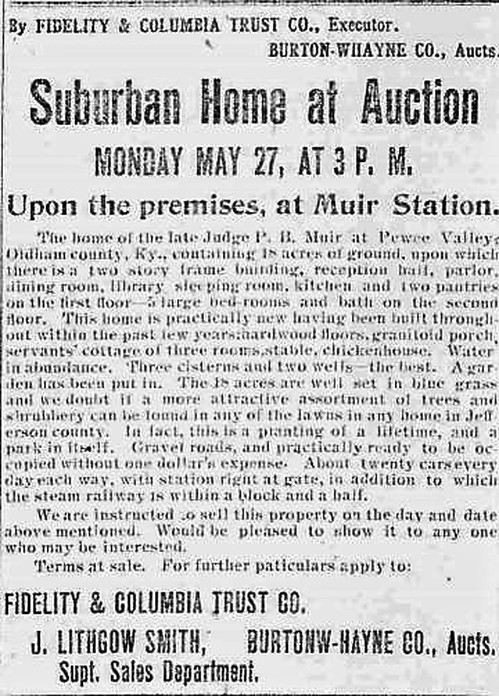
Oaklea was sold about six months after Judge Muir’s death. The following ad promoting the auction of the house appeared in the May 16, 1912 issue of The Jeffersonian:
SUBURBAN HOME AT AUCTION
MONDAY, MAY 27 AT 3 P.M.
Upon the premises at Muir Station
The home of the late Judge P.B. Muir at Pewee Valley, Oldham County, Ky., containing 18 acres of ground, upon which there is a two-story frame building, reception hall, parlor, dining room, library, sleeping room, kitchen and two pantries on the first floor – five large bedrooms and bath on the second floor. This house is practically new, having been built throughout within the past few years; hardwood floors, granitoid porch, servants’ cottage of three rooms, stable, chickenhouse. Water in abundance. Three cisterns and two wells – the best. A garden has been put in. The 18 acres are well set in blue grass and we doubt if a more attractive assortment of trees and shrubbery can be found in any of the lawns in any home in Jefferson County. In fact, this is a planting of a lifetime and a park in itself. Gravel roads and practically ready to be occupied without one dollar’s expense. About 20 cars every day each way, with station right at gate, in addition to which the steam railway is about a block and a half.
We are instructed to sell the property on the day and date mentioned. Would be pleased to show it to any one who may be interested.
FIDELITY & COLUMBIA TRUST CO.
SUBURBAN HOME AT AUCTION
MONDAY, MAY 27 AT 3 P.M.
Upon the premises at Muir Station
The home of the late Judge P.B. Muir at Pewee Valley, Oldham County, Ky., containing 18 acres of ground, upon which there is a two-story frame building, reception hall, parlor, dining room, library, sleeping room, kitchen and two pantries on the first floor – five large bedrooms and bath on the second floor. This house is practically new, having been built throughout within the past few years; hardwood floors, granitoid porch, servants’ cottage of three rooms, stable, chickenhouse. Water in abundance. Three cisterns and two wells – the best. A garden has been put in. The 18 acres are well set in blue grass and we doubt if a more attractive assortment of trees and shrubbery can be found in any of the lawns in any home in Jefferson County. In fact, this is a planting of a lifetime and a park in itself. Gravel roads and practically ready to be occupied without one dollar’s expense. About 20 cars every day each way, with station right at gate, in addition to which the steam railway is about a block and a half.
We are instructed to sell the property on the day and date mentioned. Would be pleased to show it to any one who may be interested.
FIDELITY & COLUMBIA TRUST CO.
Related Links:

